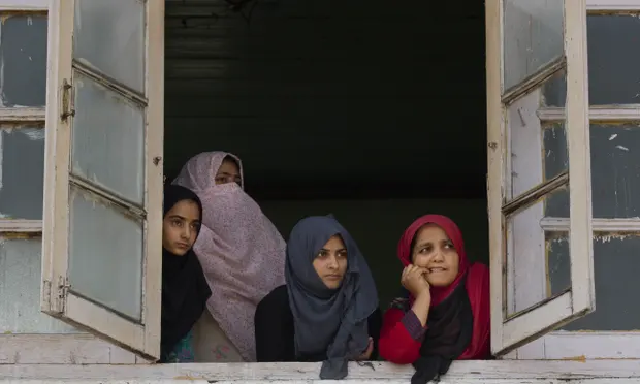
Abdul Hamid, a clinical psychologist in the region said there has been a rise in patients experiencing anxiety, stress, post-traumatic stress disorder, and heart ailments over the past 80 days.
Patients have complained about living in fear "of army raids, torture and arrests".
Dr Hamid says people who had previously learned to manage their health issues were now relapsing due to the brutalities faced by Indian occupying forces.
One such victim is Syed Ruhi who was on medication for at least two years before she felt she had recovered. Living in uncertainty about the situation outside and about her boyfriend's whereabouts, Ruhi became increasingly distressed and decided it was time to visit the district hospital's psychiatric clinic again.
Youngest victim of pellet gun violence in occupied Kashmir may lose her vision
“When someone says that the situation is not normal outside I feel mentally unwell,” she said.
The doctor prescribed her medicine and by some miracle, Ruhi happened to see her boyfriend at the hospital too.
Every day more than 170 patients visit the clinic, but the number of people requiring treatment may be far greater as many patients are unable to reach the hospital due to the communication and transport blockade.
Mustafa Ahmad, 22, is another victim to relapse. He had successfully discontinued his medication a year ago but the lockdown in the occupied valley sparked a relapse of insomnia and anxiety.
"I would normally wake up at 7am and go to the gym before working from 10am till 6pm. Now I can't sleep until 2am," he said.
"I sleep during the daytime because there is nothing to do. [The] gym is also shut."
“I fear getting arrested, then what will happen to my family? Or if I am hit by bullets or a teargas shell. I didn’t expect [the clampdown] to be so long and uncertain.”
According to a 2015 survey by Médecins Sans Frontières, at least 1.8 million adults in the occupied valley – 45 per cent of the population – showed symptoms of mental distress. More than 41 per cent of the population showed signs of depression, 26 per cent signs of anxiety and 19 per cent showed symptoms of post-traumatic stress disorder.
Dr Aijaz Ahmad Khan another clinical psychologist said the situation is getting worse. “A week after August 5, we saw a change in the patients. We started having patients who had psychological disturbances. It is increasing since then,” he said. “There is emotional numbness and it is increasing.”
He said the number of patients visiting the clinic has drastically increased - with 70-80 patients about a year ago, and 130-150 patients a day, since the clampdown.
Another victim 22-year-old Romana said she was suffering from paranoia. “I feel sick while at home,” said Romana, a computer studies student. “If a person wants to go somewhere, you can’t. People are panicked, so am I … I feel scared.”
1732434981-0/BeFunky-collage-(10)1732434981-0-405x300.webp)





1732428810-0/Copy-of-Untitled-(3)1732428810-0-270x192.webp)
1732425487-0/BeFunk_§_]__-(42)1732425487-0.jpg)









COMMENTS
Comments are moderated and generally will be posted if they are on-topic and not abusive.
For more information, please see our Comments FAQ